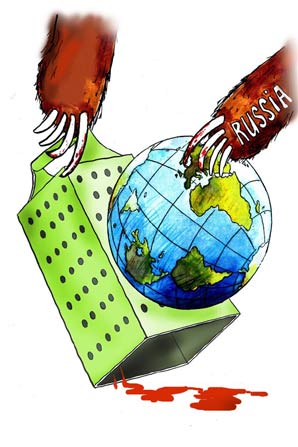
That hasn't happened.
Putin unleashed missile attacks on Ukraine's cities and its electrical grid, but the Ukrainians repaired their transformers and fought on.
Putin unleashed a mercenary force, the Wagner Group, which used convicts to try to take the eastern Ukrainian city of Bakhmut. They're still trying.
Putin cut natural gas supplies to the West, hoping to freeze comfortable Europeans into abandoning Ukraine. But Europe's winter has been one of the warmest on record; gas prices are lower than they were before Russia invaded Ukraine.
Instead of abandoning Ukraine, the United States and its allies are sending more aid: Patriot missiles and Bradley fighting vehicles from the U.S., Challenger tanks from Britain, armored vehicles from Germany and France.
That doesn't mean Ukraine is winning. The winter war has settled into a stalemate, with little territory changing hands.
President Volodymyr Zelensky's promise that victory is coming may be good for morale, but remains premature.
Putin has told foreign visitors that he's planning for a two- or three-year war. He says he's confident his larger forces can outlast Ukraine and its allies.
Both sides are preparing for new offensives this spring.
Russia is training an estimated 150,000 conscripts to launch new attacks, drawing on its seemingly limitless manpower.
Ukraine is waiting for those new weapons from the West, including anti-aircraft missiles and armored vehicles more advanced than any they have now.
U.S. Defense Secretary Lloyd J. Austin III and European officials will meet in Germany this week to agree on a resupply list that for the first time could include advanced heavy tanks.
Pentagon officials say the goal is not merely to enable Ukraine to defend itself, but to push Russia out of areas it invaded last year.
"We are positioning Ukraine to be able to move forward and retake territory," Deputy Assistant Defense Secretary Laura K. Cooper told reporters.
U.S. officials don't believe Ukraine is likely to retake all of the land Russia has occupied; they're not counting on the Russian army to collapse.
Instead, they hope Ukrainian successes on the battlefield will convince Putin that the war has become a losing proposition and that it's time to negotiate a truce. If negotiations start, the U.S. wants Ukraine to bargain from a position of strength.
But there's a problem with that optimistic scenario: Neither Russia nor Ukraine appears eager to compromise.
Putin has rejected giving up any of the five Ukrainian regions he has annexed to Russia, even though four aren't fully under Russian control.
Zelensky has dug in on his position that Russia must give up every inch of Ukrainian territory including the Crimean peninsula, which Putin seized in 2014. Public opinion polls have found that a solid majority of Ukrainians support those demands.
All of which leads some foreign policy experts to conclude that the most likely outcome isn't military victory or a negotiated peace, but a "frozen conflict."
"Rather than assuming that the war can be ended through triumph or talks, the West needs to contemplate a world in which the conflict continues with neither victory nor peace in sight," Ivo Daalder of the Chicago Council on Global Affairs and James Goldgeier of American University wrote in Foreign Affairs last week.
"Not all wars end — or end in permanent peace settlements," they noted.
As examples, they cite the Korean War, which has officially continued despite a 1953 armistice; the 1973 war between Israel and Syria, which produced only "disengagement agreements"; and Russia's 2014 seizure of Crimea and other parts of Ukraine, a clash that had become largely frozen before last year's invasion.
A freeze wouldn't solve the underlying conflict. It wouldn't be the resounding defeat for Putin's aggression that Ukrainians and their allies around the world hope for.
Ukraine would worry, rightly, that such an outcome would give Russia time to regroup, refit its battered army and try again.
It would mean the United States and its allies would need to continue massive support for Ukraine — both to enable it to defend against the next Russian invasion and to rebuild its economy. Daalder and Goldgeier propose a formal NATO security guarantee for Ukraine, even if the country isn't admitted to the alliance as a member.
Their proposal adds up to a strategy of stabilizing Ukraine and containing Russia, much like the containment policy the United States applied to the Soviet Union during 45 years of Cold War. With luck, Ukraine and the West will be able to wait Putin out and seek a settlement with his successors.
Such a strategy would be costly, and even risky. Frozen conflicts aren't always trouble-free; just look at Korea, Syria and Crimea.
The plan would ask Americans to support aid to Ukraine for years or decades, even as Republicans, once the party of anti-Soviet resolve, complain about the cost.
But foreign policy is often a choice among options that are less than ideal — and a cold war is less destructive, and probably cheaper, than a hot one.
(COMMENT, BELOW)
Previously:
• 01/10/23: The real winner from the House fight?
• 12/28/22: Why Trump will never go to jail over Jan. 6
• 12/20/22: Democracy around the world is looking a little healthier, at least next to the alternative
• 12/13/22: Biden's policy makes Ukraine fight by rules Russia doesn't follow
• 12/09/22: Iran protests have shoved the nuclear issue off center stage. It will be back
• 09/20/22: Biden sent the wrong message on COVID. He can still fix it
• 09/20/22: Putin's brutality in Ukraine can get worse. Get ready for a chilly winter
• 09/13/22: China's economy is slowing, its population aging. That could make it dangerous
• 06/28/22: To deter China on Taiwan, Biden needs to reassure
• 05/24/22: India has become a US partner in countering China --- a limited partner, that is
• 05/11/22: Slow Joe's premature self-congratulation won't help the US in Ukraine
• 05/03/22: Can the US deter Putin from using his arsenal of battlefield nuclear weapons in Ukraine?
• 04/08/22:Biden's budget is big. Dems will vote to make it bigger
• 03/22/22: Ukraine's resistance offers a useful lesson to Taiwan
• 03/15/22: China wanted to appear neutral between Russia and Ukraine. It isn't
• 02/22/21: Who needs an invasion? Putin's offensive against Ukraine has been underway for a long time
• 02/09/21: If Putin wants an exit from the Ukraine crisis, the offramps are open
• 11/30/21: Biden wants to focus on China. Putin has another idea
• 11/23/21: Our oldest president just turned 79. He might have something to learn from the second-oldest
• 11/16/21: Can Biden and Xi talk their way out of a slide into conflict?
• 10/13/21: Congress has a chance to take bipartisan action on Facebook. Don't let it slip away
• 09/24/21: Can Dems win on crime issues with murders rising? Biden thinks so
• 06/29/21: Can Dems win on crime issues with murders rising? Biden thinks so
• 04/20/21:Afghanistan's war -- and America's stakes in it -- won't end when the troops leave
• 03/31/21: Here's why our new cold war with China could be a good thing
• 02/25/21: Sen. Joe Manchin drives Dems crazy. Here's why they need more senators like him
• 08/11/20: Goodbye to traditional political conventions --- and good riddance
• 05/19/20: We won't end COVID-19 with 'test and trace'
• 04/07/20: Joe Biden is stuck in his basement. It just might help him win
• 03/10/20: Where did Bernie's revolution go wrong?
• 03/05/20: Dems give Trump good reason to smile
• 02/18/20: Who will be the Un-Bernie?
• 02/11/20: Buttigieg wants to be the Goldilocks candidate. It just might work
• 01/21/20: The world according to Bernie
• 09/04/19: Trump's draft deal with the Taliban looks ugly, but it may be the best we can get
• 04/22/19: Something is missing from media-fawning Buttigieg campaign --- his stance on major issues
• 03/14/19: Biden, If He Runs, Will Face A Cruel Irony
Doyle McManus
Los Angeles Times
(TNS)
Doyle McManus is an American journalist, columnist, who appears often on Public Broadcasting Service's Washington Week.


 Contact The Editor
Contact The Editor
 Articles By This Author
Articles By This Author